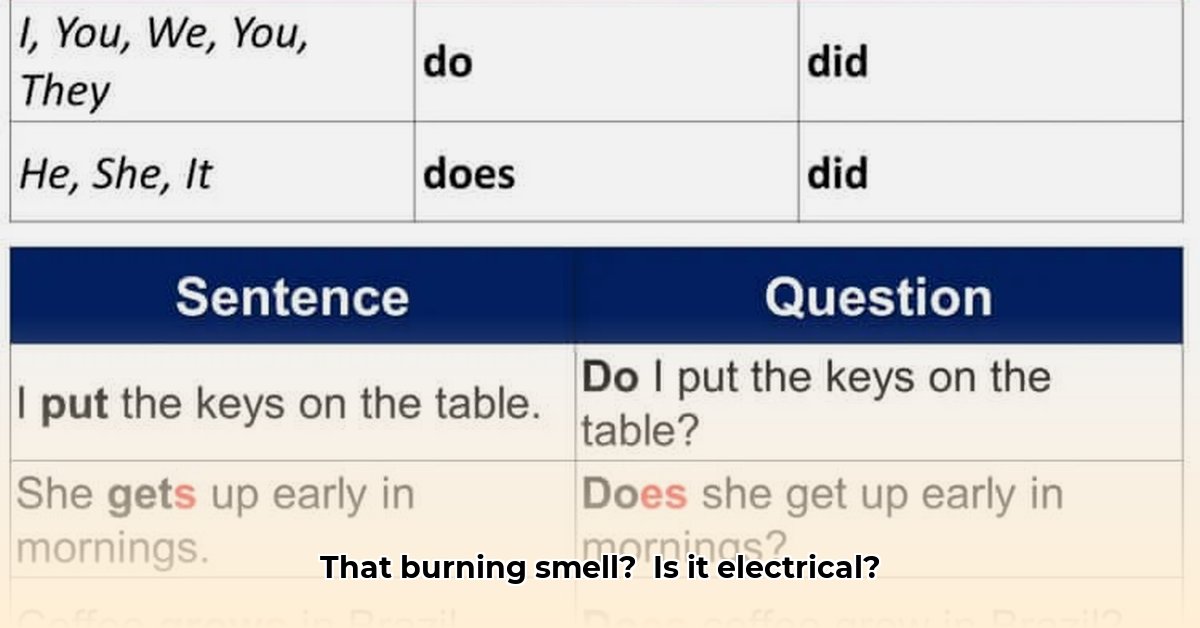Ever smell something weird, like burning plastic or a strange, almost sweet smell? It could be a sign of an electrical fire, and catching it early is really important. This guide will help you understand what those smells mean and what to do if you think you might have a problem. We’ll break down the different smells you might encounter, explain why they happen, and give you clear steps to take to keep yourself and your family safe. Learning to recognize these warning signs can prevent a serious fire and protect your home. For more on fire safety, check out [fire extinguisher lifespan](https://turthledeep.com/how-long-are-fire-extinguishers-good-for/). Let’s learn how to spot the danger before it becomes a disaster.
What Does an Electrical Fire Smell Like? Electrical Malfunction Guide
Ever wondered what an electrical fire smells like? Knowing this could be a lifesaver – literally. It’s a smell you’ll hopefully never forget, but it’s vital to understand what it might be so you can react quickly. Let’s explore this crucial fire safety topic.
Unmasking the Smell of Electrical Trouble: Early Detection
The smell of an electrical fire isn’t always a dramatic, Hollywood-style blaze. Often, the first hint is subtle – a faint, almost fishy odor, or maybe something slightly acrid, like burnt plastic. This usually means something electrical is getting too hot. Think of it as a quiet warning signal, a little unusual, not quite like anything you usually smell.
As things heat up (literally!), the smell changes, becoming stronger and more noticeable. That’s because the insulation around wires starts to burn, adding a sharp, distinctly plastic or rubbery scent to the mix. It’s a much more intense, acrid smell – hard to miss. But here’s the thing: some electrical fires produce little to no noticeable odor, particularly in their early stages. So, don’t solely rely on your nose.
Why That Strange Smell? Understanding the Chemical Odors
The unusual smells come from the materials burning. Plastics and rubber in your wires and appliances release gases as they break down from the intense heat. These gases are what create the “fishy,” “burning plastic,” or acrid smell. The exact smell depends on the materials involved and how hot things get. It’s a bit like a chemical fingerprint of the burning materials.
Beyond the Nose: Other Red Flags Electrical Safety
While knowing what an electrical fire smells like is valuable, your nose isn’t your only early warning system. Other signs to watch out for include flickering lights – especially if it’s just one or two lights acting oddly – sparking outlets, wires that look discolored or unusually warm, and, of course, any burning smells near electrical appliances or equipment. These are all serious clues pointing to a potential problem. Buzzing sounds near outlets or electrical panels are also a cause for concern. If you notice any of these signs, it’s important to investigate further.
What to Do if You Smell Trouble: Emergency Action Plan
This isn’t a drill:
-
Get Out Now: Safety first! Evacuate immediately. Get everyone out of the building as quickly as possible. Don’t risk your safety.
-
Call for Help: Dial 911 (or your local emergency number) immediately. Give the dispatcher a clear, concise location and description of what’s happening.
-
Leave It to the Pros: Do not attempt to put out the fire yourself. Electrical fires are extremely dangerous, and untrained attempts can be incredibly risky. Let trained firefighters handle it.
-
Stay Safe: Stay far away from the building and await the arrival of emergency responders.
Preventing Electrical Fires: A Smart Approach Appliance Safety
The best way to deal with an electrical fire? Prevent it! Here’s how you can reduce the risk significantly:
-
Regular Check-ups: Regularly inspect electrical cords, appliances, and outlets for any signs of damage like cracks, fraying, or unusual wear on the cords and plugs. Damaged items should be replaced immediately. Don’t wait until you see sparks.
-
Don’t Overload Circuits: Avoid plugging too many appliances into a single outlet or circuit. Overloading can cause overheating, which is a major cause of electrical fires. That surge protector you have? Use it! Distribute the load across multiple outlets whenever possible.
-
Appliance Maintenance: Keep your appliances in good shape. Address any malfunctions promptly. A bit of preventative maintenance can prevent a big problem. Clean appliances regularly to prevent dust buildup, which can contribute to overheating.
-
Professional Help: Consider having a qualified electrician inspect your home’s electrical system every couple of years, especially in older houses. It’s a small investment that could save you big time. If you live in an older home, consider upgrading the wiring to meet modern safety standards.
Is it Always Obvious? Thinking about the Uncertainties
While we’ve talked about the typical smells, it’s important to remember that not every electrical fire gives an obvious warning. Some fires might smolder silently, producing very little, if any, smell; others may present with unusual smells unrelated to common indicators. For example, a musty or moldy smell could indicate water damage near electrical components, which can increase the risk of a fire. Ongoing research explores the diverse chemical signatures of different types of electrical fires, depending on the materials involved and how the fire starts. This highlights the importance of being aware of all the warning signs we discussed, not just relying on smell alone. Install smoke detectors on every level of your home and test them monthly to ensure they are working properly.
In Conclusion: Safety First Electrical Hazards
Knowing what an electrical fire might smell like is incredibly helpful, but it’s just one piece of the puzzle. Being vigilant, acting quickly, and implementing preventative measures is the best approach. Your safety and the safety of your home matters most. Don’t hesitate to contact a qualified professional if you have any concerns. Familiarize yourself with the location of your home’s main electrical panel and how to shut off the power in case of an emergency.
How to identify the subtle smell of an electrical fire before it spreads Circuit Overload
Key Takeaways:
- Electrical fires often start subtly, with distinctive smells acting as early warning signs.
- Recognizing these smells can prevent significant damage and potential injury.
- Immediate action is crucial upon detecting any suspicious odor or electrical malfunction.
- Proactive safety measures, including regular inspections, are essential for prevention.
Recognizing the Telltale Signs: What Does an Electrical Fire Smell Like? Home Wiring
Have you ever noticed a strange smell in your home? It’s crucial to be able to distinguish a typical burning smell from the unique aroma of an electrical fire. That’s because an electrical fire often manifests its presence long before flames appear. The distinctive smell provides your first clue. It’s a critical warning you can’t afford to ignore.
The most common description is a burning plastic smell, think melted wires or a scorching electrical component. But it’s not always that straightforward. Sometimes, you might detect a fishy odor, akin to ozone or even faintly sweet. Other times, a metallic scent could be a harbinger of trouble. The exact smell depends on what’s burning—the type of insulation, surrounding materials, and the stage of the fire. This is where how to identify the subtle smell of an electrical fire before it spreads becomes critical. Consider the age of your home and electrical system; older systems are more prone to problems.
The odor might be faint at first, easily mistaken for something else. This is why paying attention to its location and intensity is vital. A persistent, localized smell warrants investigation. If you notice an unusual smell, try to identify its source. Check outlets, appliances, and electrical panels for any signs of damage or overheating.
Beyond the Smell: Other Warning Signs Electrical Outlets
Don’t solely rely on your nose. Other indicators suggest a potential electrical fire. Flickering lights shouldn’t be dismissed. A persistent buzzing sound from an outlet or appliance is another red flag. Repeated tripping of circuit breakers may indicate an overloaded circuit or a fault somewhere in your electrical system. Discolored outlets or scorch marks are blatant signs of overheating. Warm or vibrating outlets are also a cause for concern. These combined warning signals are equally crucial in how to identify the subtle smell of an electrical fire before it spreads. Pay attention to any changes in your home’s electrical system.
What to Do If You Suspect an Electrical Fire Electrical Safety Tips
Acting quickly is paramount. If you detect any of these warning signs, immediately:
- Evacuate the premises: Get everyone out of the building safely. Don’t risk your health or life.
- Call emergency services: Alert your local fire department without delay. They are equipped to handle the situation safely and effectively.
- Don’t attempt to extinguish it yourself: Unless you are a trained professional with the right equipment (a Class C extinguisher), trying to put out an electrical fire yourself is extremely dangerous. Electrocution and further damage are very real risks.
- Report the incident: After the emergency is over, report the incident to your landlord or building manager, along with the specific locations to facilitate investigation and repairs. Document the incident with photos or videos for insurance purposes.
Preventing Electrical Fires: A Proactive Approach Electrical Panel
Prevention is better than cure. Here’s how you can safeguard your property and loved ones:
- Regular inspections: A professional electrician should inspect your electrical system every 3-5 years minimum, or more often if you have older
- How to Stop Apps From Running in the Background to Boost Your - December 1, 2025
- How To Move Apps On Your Droid For Better Organization - November 30, 2025
- How to Move Apps on Android for Better Organization - November 29, 2025










